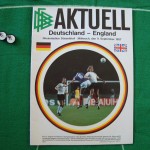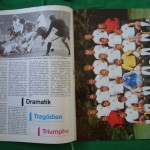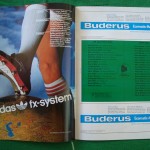Friendly International
Rheinstadion, Düsseldorf, 09.09.1987
![]()
3-1 (2-1)
Littbarski 24., 33., Wuttke 84. / Lineker 42.
Germany: Immel – Herget – Brehme (61. Reuter), Kohler, Buchwald, Frontzeck – Littbarski, Thon, Dorfner – Völler (78. Wuttke), K. Allofs (c)
England: Shilton (c) – Anderson, Adams, Mabbutt, Sansom (78. Pearce) – Waddle (Hateley), Reid, Hoddle, Webb – Beardsley, Lineker
Colours: Germany – white shirts, black shorts, white socks; England – red shirts, white shorts, red socks
Referee: Paolo Casarin (Italy)
Assistants: Cornieti Werter, Frigerio Moreno (Italy)
Yellow Cards: – / –
Red Cards: – / –
Attendance: 50,000
Match Programme Details
The A4-sized edition of the DFB official match programme Aktuell for the 1987 friendly match in Düsseldorf contains fifty pages, and was priced at two Deutsche Mark. The cover features an image from Germany’s previous home fixture against France in Berlin, with Luis Fernandez being beaten in the air by Hans Dorfner with Rudi Völler looking on.
After the introduction by DFB President Hermann Neuberger, there is a review of Germany’s previous matches in the buildup to their hosting Euro ’88 as well as an interview with veteran striker Klaus Allofs and “Das Duell” – a feature focussing on past games against England.



Aspect: Portrait
Dimensions: 285 x 210 mm
Numbered Pages: 50
Language(s): German
Match Report
The German team that took to the field against England at Düsseldorf’s Rheinstadion in the autumn of 1987 had seen a number of changes from the squad that had finished runners-up to Argentina in the World Cup in Mexico the year before: the talismanic skipper Karl-Heinz Rummenigge had since retired from international duty alongside midfielder Felix Magath and defensive stalwarts Hans-Peter Briegel and Karl-Heinz Förster, while others who had made the Mexico City line-up such as Norbert Eder, Ditmar Jakobs and Dieter Hoeneß had also made their final appearances for the Mannschaft.
Also missing from Franz Beckenbauer’s side was goalkeeper Harald “Toni” Schumacher, who in the autumn of 1986 had found himself excluded by both club and country on account of a number of statements made in his controversial autobiography, Anpfiff. Schumacher’s sudden excusion saw him being replaced by VfB Stuttgart’s Eike Immel, who found himself back in the national setup after more than four years in the wilderness.
Only three members of Germany’s starting eleven in Düsseldorf – Klaus Allofs, Andreas Brehme, and Rudi Völler – had played a part in the World Cup Final the year before, while only four had been in the side that had faced England in Mexico City two years earlier: Brehme, Matthias Herget, Pierre Littbarski and Olaf Thon. Also in the mix were two promising young players, 1. FC Köln defender Jürgen Kohler – who was winning his sixth international cap – and FC Bayern München midfielder Hans Dorfner who was making his second appearance in the Schwarz und Weiß having made his debut the previous month against France in Berlin.
England meanwhile were able to present a far more settled line-up, with seven of their starting eleven having been in their twenty-two man World Cup squad; the side also saw the return of defenders Viv Anderson and Gary Mabbutt, while new faces included the twenty year old Arsenal defender Tony Adams and Nottingham Forest midfielder Neil Webb, who was poised to make his international debut from the bench.
It was almost the opposite situation from the 1982 friendly at Wembley, where a then new-look England side under a new manager had faced up to Jupp Derwall’s established German eleven. Only three of the twenty-two players who had lined up at Wembley would be on the field in Düsseldorf: defenders Sansom and Mabbutt for England, and Pierre Littbarski for Germany. At Wembley, it had been the twenty-two year old Littbarski who had changed the course of the game: having been brought on a substitute late in the second half, he had made an immediate impact by setting up two Karl-Heinz Rummenigge goals. Five years later in Düsseldorf, the tricky little winger would return to haunt England once more.
The new-look German side looked impressive right from the off, with Rudi Völler looking particularly sharp in attempting to out-sprint the England defence. Before the men in red had even settled down Völler had charged past Gary Mabbutt and Tony Adams, placing a firm left-footed shot just over the crossbar. Soon afterwards ‘keeper Peter Shilton was warming his gloves as German skipper Klaus Allofs found the target with a crisp, low shot.
Germany’s controlled passing game was as steady as ever, but was combined with a smooth dynamism and confidence that had been lacking the previous year in Mexico. Beckenbauer’s side were patient in the build-up, waiting for the right opportunity which would see them stream forward in numbers.
The pace and movement clearly unsettled the England defence, as Kenny Sansom almost gifted Allofs with the opener with just over ten minutes on the clock. After picking up the ball from sweeper Matthias Herget in his own half, Guido Buchwald launched a high ball to Andreas Brehme on the right who with his first touch attempted to lob the ball into the box. It was intercepted by Sansom, who was probably unaware of the Allofs closing up on him; while he would have been better off putting the ball behind for a corner, he attempted a near-impossible backpass to Shilton. It instead fell to Allofs, who with a deft flick of his left boot beat the England keeper but hit the outside of the near post.
Within minutes Allofs was almost in again as he pounced on a loose piece of control by Arsenal’s twenty year old defender Tony Adams, who recovered well to put the ball behind. The home side should have taken the lead from the resulting corner, as Shilton’s fumble laid a chance on a plate for Olaf Thon, who was unmarked in front of goal. Thon’s first touch however was poor, and as he swung his foot he was able to catch only part of the ball as it was rolling away from him.
It was only a matter of time before Germany would find the back of the net, and with twenty-four minutes on the clock the inevitable happened. After a patient exchange of horizontal passes in midfield, Herget found Pierre Littbarski just outside the box. The little 1. FC Köln man jinked and twisted his way into space and almost casually lost his markers before cracking a right-footed shot past Shilton and into the top left-hand corner of the net from at least twenty yards. It was the least Franz Beckenbauer’s side deserved for what had been a sparkling opening spell.
It could very easily have been 2-0 just minutes later, as Hans Dorfner’s neatly-timed pass beat a lazy England offside trap to find Völler in space on the right. The tousle-haired striker bore down on the England goal at pace, before checking his stride, rounding Sansom and bringing the best out of Peter Shilton who turned the ball over for a corner. The danger was not yet over however, as Buchwald’s nod back into the area from the corner found Viv Anderson and Tony Adams make a dog’s dinner of the clearance, leaving Völler with enough time to get a shot in and lift the ball over the bar. With half an hour gone, German ‘keeper Eike Immel had not even been in the game, and his side could have easily been three or four goals up.
The tireless Völler was still running rings round the England defence, and after charging past Adams down the left was caught extremely late by Anderson, who was perhaps lucky not to receive the yellow card. From the resulting free-kick came Germany’s sixth corner, which was curled in by Littbarski – straight into the net. The ball appeared to have taken a slight deflection off a leaping England defender, and Shilton was left floundering at the near post clutching thin air. The Mannschaft were now two goals to the good and cruising.
Then came a goal for England out of nowhere. Three minutes from half-time, Buchwald was caught dallying just outside his own area as Peter Reid came in with a crunching two-footed challenge for the loose ball. With the Germans expecting the Italian referee to blow for a free-kick, the ball fell to Peter Beardsley who found Gary Lineker, who positioned himself between Brehme and Jürgen Kohler before stabbing a somewhat Mülleresque right-footed shot past the advancing Immel. Beckenbauer’s side could and perhaps should have been three or four goals up, but in a blink of an eye the visitors were back in the contest; Lineker’s strike was his twentieth goal in his tenth international, and was also the hundredth goal of Bobby Robson’s tenure as manager.
There was still time for Germany to launch one further attack before the break, as another neat pass from the impressive Herget found Brehme rampaging down the right. The blond winger’s cross was perfectly delivered into the box but was a fraction too high for the leaping Völler; the ball’s awkward bounce clearly didn’t help Allofs, who had come flying in to meet it at the far post.
England started the second half as they had finished the first, and John Barnes perhaps should have done better when he managed to get around the back of defence with just Immel to beat. Manager Bobby Robson was clearly looking for a result, and threw on another forward in Mark Hateley for Chris Waddle. Within minutes of his arrival Hateley picked up a precise pass down the left from Sansom, and having danced past Buchwald into the box saw his cross-cum-shot palmed away by Immel. As Peter Reid charged towards the loose ball, Immel stood his ground brilliantly to beat the ball away. For all Germany’s dominance during the first half, it could so easily have been level at 2-2.
Perhaps with aim of trying to inject more speed at the back and down the right, Beckenbauer replaced Brehme with the twenty year old Stefan Reuter, and after what had been a fairly torrid spell the Mannschaft slowly started to reassert themselves in midfield. The tiring Rudi Völler was replaced by Wolfram Wuttke, and within six minutes of coming on the 1. FC Kaiserslautern man had sealed the game: it was the result of the tried and trusted German formula: the patient build-up, the burst of pace and the high-powered finish.
After an England attack had been broken down by Guido Buchwald deep in in his own half, the tall Stuttgart man exchanged passes with Hans Dorfner before laying the ball back to Reuter, who in turn rolled it back towards his own area to Matthias Herget. With Mark Hateley charging towards him, Herget nonchalantly turned and found Olaf Thon, who suddenly burst through two England players and into the opposition half. As the England defence headed rushed towards the box Thon gently laid the ball out to the left, where he found Wuttke in space. As the defence continued to back off, Wuttke sashayed inside towards the edge of the area before unleashing a curling shot that rocketed into the top right-hand corner of the net. It took the slightest of deflections off Viv Anderson, but it was the goal that the match deserved as Franz Beckenbauer’s side went 3-1 up.
It perhaps should have been four in the final minute when after a neat one-two with the impressive Herget Littbarski chipped a delightful long pass for the speedy substitute Reuter to chase. The 1. FC Nürnberg man appeared to have done the hard work in chasing the ball and chesting it down, but perhaps took one stride too many. Just as he was about to pull the trigger, the hard-working Viv Anderson slid in to clear the danger.
A 4-1 result would not have flattered the home side, but when the final whistle blew that had to satisfied with three. It was the perfect tonic for Nationaltrainer Franz Beckenbauer, who was finally starting to put the final pieces of the puzzle together in building a team that would compete on home soil in the European Championship finals the following year.
The 1987 friendly in Düsseldorf would be the last meeting between the two sides before the turn of the decade. England’s overall performance had seen a marked improvement on the previous decade, though even with Germany going badly off the boil at the end of the Derwall era the Mannschaft had still managed to get the better of the games between the two teams in the four games that were played.
Both sides would qualify for the finals of the 1990 FIFA World Cup in Italy, which would play host to their next and arguably most memorable encounter in recent years – the “classico” in Torino.
Cumulative Record
Home: played 11, won 3, drawn 3, lost 5. Goals for 16, goals against 25.
Away: played 8, won 2, drawn 0, lost 6. Goals for 8, goals against 24.
Neutral: played 3, won 1, drawn 1, lost 1. Goals for 3, goals against 5.
Overall: played 22, won 6, drawn 4, lost 12. Goals for 27, goals against 54.
